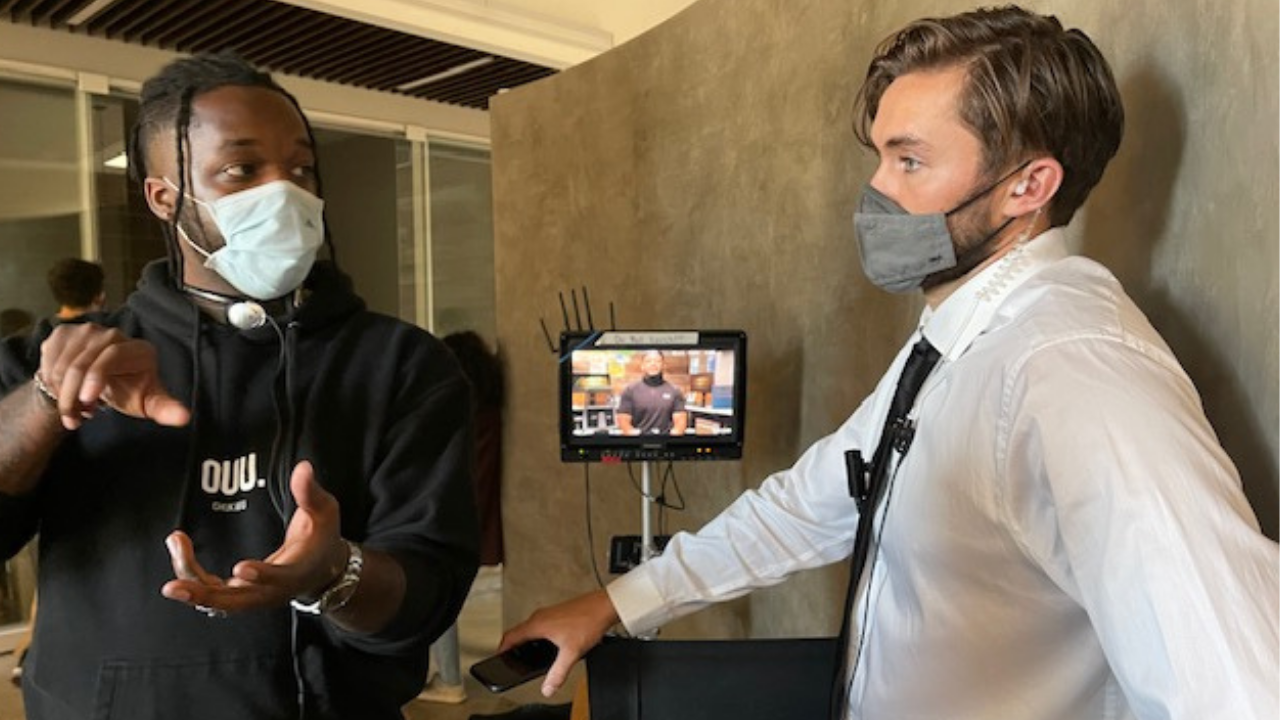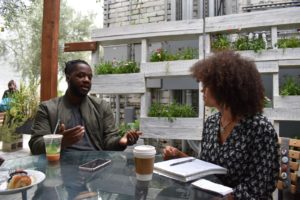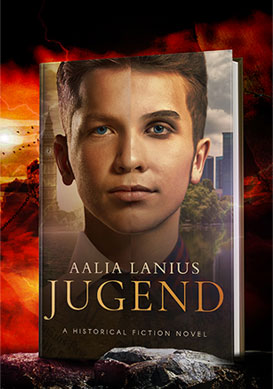
Laughing and Learning: Tevin Everett On His Show, Diversity Hires, And The Power of Storytelling
Written by: Kimberly Henry Senior Staff Writer UNSUGARCOATED Media
May28,2021
Diversity and representation have been issues for the American media industry since its very creation, but a recent wave of diverse content signals to some that things may be changing. Still, controversial films and shows like Queen and Slim, Antebellum, Lovecraft Country and Them, have many wondering when we will be able to see impactful, diverse stories without having to re-live decades of trauma on screen.
If navy veteran and independent filmmaker, Tevin Everett, has anything to say about it, the answer would be… well, right now. The writer, director, and founder of A Tevin Everett Jawn production company has just finished producing his newest project, Diversity Hires.
Based on Everett’s award winning webseries, the mocumentary sitcom pilot tells the story of four “tokens,” minorities hired to make a company look diverse, and the workplace discrimination they face. But what sets Diversity Hires apart is Everett’s commitment to using comedy rather than trauma to send an impactful message. Through Diversity Hires, Everett and his team hope to bring a fresh take to diverse storytelling.
Far from the cliche film-school prodigy, Everett says he first began honing his storytelling skills while serving in the navy as an intelligence analyst, an experience that gave him valuable perspective as well.
“Intelligence is just reporting back for people who didn’t see it … and then writing it down in a way that other people can read it and digest it. … Intel you do something wrong, people die. Here you do something wrong, your script doesn’t get picked up,” he says, chuckling at the comparison.
The military isn’t just where Everett learned how to tell stories, it’s where he learned their power. After being injured on assignment, Everett couldn’t walk for a year and says he turned to film to make it through the recovery process.
“When you can’t really do something that you’ve been doing your whole life, it’s a depressing thing. And I was intel, right, so I couldn’t exactly tell my parents where I was or what happened,” Everett reminisces. “So at that point, cinema kind of saved my life. … Eventually I decided that’s what I wanted to do for other people.”
If you’re wondering what kind of person leaves their military career of eight years to pursue a dream of filmmaking, Everett might answer, the same kind of person that joins the navy without knowing how to swim.
“They don’t really teach you how to swim in bootcamp. They do this thing where you get up to a platform and they’re like, alright on the count of three step off. … So yeah, they pushed me, which was funny, and I made it to the other side,” Everett shrugs. “So I can’t swim but I can survive, that was the lesson I learned in bootcamp.”
Everett did more than survive his transition to filmmaking. His projects like The Don’t Call List and the Diversity Hires webseries received recognition and accolades on the festival circuit, winning awards at the Top Shorts Film Festival and the New York Film Awards. But still, the path to the Diversity Hires pilot was by no means a guarantee.
As a Black filmmaker, Everett is all too aware of the risk of getting pigeon-holed into writing a certain kind of story in Hollywood. More importantly, the stories that Everett most connected with while recovering from his injury were Black stories that had nothing to do with racism, that better reflected his childhood in his mostly Black Delaware community.
“Racism didn’t really reach us there, but we had other Black stories. Our parents get alzheimers, our parents get cancer, all that stuff still happens so being able to see those stories was so important. … I know that is a harsh intersection to Diversity Hires,” Everett chuckles. But something kept bringing him back to that story.
“Experience is the best teacher,” Everett says. “I was one of five black intelligence analysts and so every room I was in, it was always me speaking for the whole of the black community. I felt like I owed it to other people who were in situations like that to at least make this show, and be like, hey you’re not alone.”
Still, in making Diversity Hires, Everett was determined not to write a People of Color-By-Numbers show, and humor was a large part of how he achieved that.
“When you try to force feed people something in a serious way, like in a drama they always turn away from it,” Everett explains. “But when you put something into a comedic form, when you’re laughing, you’re also learning…. That’s my motto.”
While humor is one of Everett’s goals, Diversity Hires is not simply The Office but with Black people. Everett set out to highlight the complexity that exists within marginalized groups, from colorism to gender, from politics to sexuality.
But to tell a story that goes beyond simple Black and white conflict, Everett needed to encounter and acknowledge his own blindspots. One such blindspot appeared in the form of an argument scene between two of the pilot’s protagonists— one a straight Black man, the other a gay white man.
The scene staged many of conflicts that crop up between the Black and LGBTQ communities, from the privilege of being an “invisible minority” to the emotional impact of living in the closet. During one of Everett’s revisions, however, he received feedback that while the Black man’s side of the argument worked, the gay man’s responses didn’t ring true.
“When it’s not my experience … I [still] tend to write from the experience of the Black man. Which is hard sometimes for the other side to get in,” Everett explains. “This is why you send the pilot out to people who don’t look like you.”
That’s exactly what Everett did— he sent the script to other LGBTQ readers to get their input as he revised the scene.
“It’s kind of like a group thought thing, and now we can get into that diversity within diversity and how does everyone [interact with each other.]” Showing those nuances not only requires characters to highlight those interactions, but a cast willing to dig into the conflict and complexity that Everett’s script stages.
A week before shooting the Diversity Hires pilot, Everett sat down with his cast for a virtual table read. The team is not immune to the characteristic awkwardness of life on Zoom, but they quickly shake off the social cobwebs,playfully teasing each other while catching up.
Chemistry is not an easy thing to create, even in person, but the cast manages to crackle with familiar electricity even through their computer screens. From an outsider’s perspective, some of the team’s camaraderie stems from the value they see in Everett’s project as media that simultaneously entertains and educates.
Speaking about his experience on Diversity Hires, actor Matthew Winton highlights the pilot’s ability to build bridges across difference. “There’s this desire that people have for connection and when you layer relevant and important stories on top of that you can really impact your audience,” says Winton.
While Winton, who is white, can see the value of playing one of the pilot’s cringe-worthy, culturally insensitive employers, the actors portraying the “diversity” of Diversity Hires have a more personal connection to the content.
For Leah Haile, who plays Aaliyah Clay, one of the hires, Everett’s script is less fiction than documentary. Raised in a mostly white Texas suburb, Haile shares many experiences with her character, like being the only Black face at her school and dealing with people trying to touch her hair without permission.
“I’m grateful that times are changing so that people in those situations … can turn on the TV and be like, ‘no wait, my feelings are valid,” Haile says. “This is messed up and I’m not crazy for thinking this is messed up.”
Haile’s experience is exactly what Everett set out to create with Diversity Hires. Now that the shooting of the pilot is complete, Everett turns his focus to editing and selling the project.
“I just want reach. Not necessarily for me to get paid, I don’t care about that, I just want this show to get to the people it’s supposed to get to, the people that need to have those conversations.”
Regardless of where Diversity Hires ends up, Everett will keep trying to make a better world with his stories— whether those stories tackle discrimination or simply show diverse characters dealing with the struggles of being human.
“Because representation does matter,” Everett insists. “I want to make sure when that kid is dealing with his grandmother who has cancer, when he turns on the movie he sees someone who looks like him that can help him through the process.”
One thing is certain— whether it’s Diversity Hires or one of Everett’s feature scripts, we will keep a sharp eye out for the next Tevin Everett Jawn. And you should, too.
If you want to learn more about how to support Diversity Hires or Everett’s other projects, check out his website or follow him on Instagram @atevineverettjawn.






